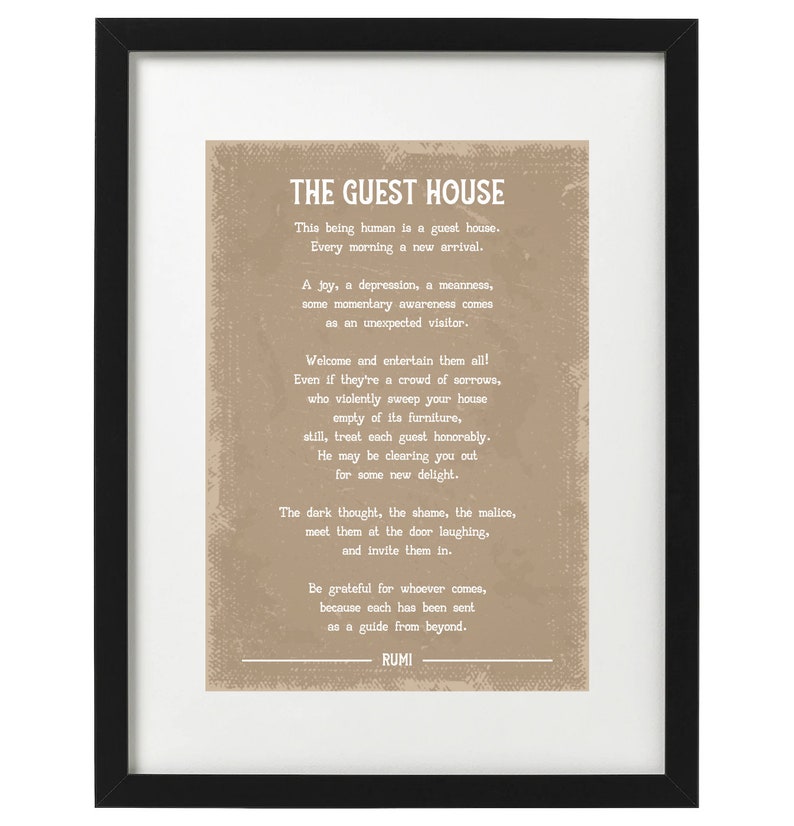
Rumi’s metaphor of the guest house beautifully illustrates the concept of unity in diversity. Each guest, be it a person, experience, or emotion, contributes to the richness of our lives. This diversity, much like the varied seasons of life, brings a dynamic rhythm to our existence, teaching us to embrace change and find harmony in life’s multifaceted journey.
Mindfulness practices buoy students in Sacramento’s Einstein Middle School - Sacramento Bee
Mindfulness practices buoy students in Sacramento’s Einstein Middle School.
Posted: Sat, 07 Feb 2015 08:00:00 GMT [source]
A holistic approach to treatment

This exercise helps students to explore and identify various poetic devices, deepening their understanding of the poem’s techniques and thematic depth. UCLA is a center of research discoveries, medical breakthroughs, and athletic achievements. Be inspired by Bruins who make things happen at UCLA and around the world.
Promoted Poems
Quality recovery includes continued care and reinforcing learned skills in daily life. Videosof the encounter have gone viral, videos of a modestly dressed young woman in a red hijab, holding a microphone, attempting to address a gathering of people on the last night of Ramadan in her dean’s garden. The danger of the poem is that it might be interpreted as a free pass to start to revel in our emotions or depressions.
Search
Rumi teaches that each visitor, or emotion, carries a message or lesson, and thus should be welcomed with equal honor and respect. Rumi’s works are celebrated for their depth, spiritual insight, and their contribution to the Sufi tradition, which often focuses on the quest for transcendent love and the profound inner transformation that accompanies it. “The Guest House” is no exception, providing readers with a guide on how to embrace every aspect of life. This poem is often categorized within the themes of wisdom literature and spiritual texts, resonating with readers across cultural and temporal boundaries due to its universal themes and emotive strength.
Life’s challenges, much like these old chestnuts, are timeless teachers. As we revisit these challenges at different seasons of life, they reveal new layers of meaning and insight, helping us to grow and evolve in unexpected ways. As women, we often feel the pressure to maintain composure, to be the rock for others. But Rumi tells us to embrace every emotion, be it joy, depression, or meanness. Just as guests leave a home slightly changed, each emotion we encounter and embrace leaves us slightly transformed. When we attempt to shut the door on our negative emotions, we deny ourselves the opportunity to learn from them.
When you reach even further on the path of meditation, you start to acknowledge that all the emotions that come up, appear for a reason. But once we reach a bit further in the meditation, you start to see that emotions indeed arise and pass. By bravely facing these challenging emotions, we learn resilience and find new depths of courage within ourselves. However, Rumi’s wisdom teaches us that these ‘unwelcome guests’ often carry the most significant lessons, pushing us towards unexpected growth and enlightenment. By embracing Rumi’s wisdom, we learn to see our emotional landscape as a rich, varied terrain that shapes who we are.
Hope in recovery and high faith in the healing power of God.
A holistic approach to treatment and care that is based on the spirituality of the 12-Step recovery model. His timeless poem, “The Guest House,” serves as a powerful metaphor for embracing every facet of our human experience. This poem, “The Guest House,” is a timeless piece that speaks to the very core of our human experience, and here’s why it still matters, especially for us women navigating the complexities of modern life. The central theme of “The Guest House” is the acceptance of all emotions and experiences as integral parts of life.
and care that is based on the spirituality of the 12-Step recovery model
For the modern woman, it’s a call to live authentically, to welcome life’s myriad experiences with open arms, and to find strength in the ebb and flow of emotions. In doing so, we not only enrich our own lives but also set a powerful example for those around us. Even if they are a crowd of sorrows,who violently sweep your houseempty of its furniture,still, treat each guest honorably.He may be clearing you outfor some new delight. Just as a guest house sees all kinds of visitors, our lives are enriched by diverse experiences and people. This diversity adds color and depth to our existence, teaching us invaluable lessons about the world and our place in it. Some are pleasant, others not so much, but each one carries a unique lesson or opportunity.
Mewlana Jalaluddin Rumi
Estranged from the roots of her homeland, unmoored from loved ones by settler-colonial interests, Afaneh, who believes that Zionism is a form of racism and settler colonialism, was compelled to respond. Afaneh agrees to leave the dinner if Fisk returns the microphone, an ugly confrontation that revealed much about power and privilege, about oppression and dispossession, about being ripped from one’s roots once again. Every seen unpleasant emotion and thought that is met with openness brings us its small dose of happiness. Better yet, thoughts and emotions that are seen mindfully, have the tendency to evaporate in the long run. When anger is seen in this way, the power it has over us is greatly reduced. As I said in my article on this topic, acceptance is not about the exterior, but about the interior.
And what speaks better to the heart than poetry, with its wordings that go beyond our logical sense and speak directly to our emotional side. In the context of Rumi’s Guest House, each visitor – or emotion – we encounter can be seen as a potential teacher. Rumi’s teachings urge us to embrace the present moment, recognizing the transient nature of our experiences. In a world that often feels as unpredictable as it is beautiful, the words of 13th-century poet, Jalaluddin Rumi, continue to offer profound guidance.
The concept of unwelcome guests in our emotional guest house is a powerful one. It challenges us to confront those feelings and experiences we’d rather avoid. How does Rumi’s background as a Sufi mystic influence the poem? Rumi’s Sufi background is evident in the poem’s embrace of transience, emotional depth, and the notion of divine orchestration behind life’s events. His teachings often focus on the inner spiritual journey, which is mirrored in how the poem encourages embracing all facets of human experience as a pathway to spiritual enlightenment. Rumi’s “The Guest House” is a timeless reminder to embrace every aspect of our journey.
Each feeling is a visitor, guiding us towards our personal growth and self-discovery. By acknowledging and respecting our emotions, we honor our true selves. This essential understanding encourages us to view each day as an opportunity for spiritual growth and self-discovery, fostering a deeper appreciation for the tapestry of life that weaves together both joy and sorrow.
A joy, a depression, a meanness,some momentary awareness comesas an unexpected visitor. Even if they’re a crowd of sorrows, who violently sweep your house empty of its furniture, still, treat each guest honorably. Holistic healing includes all aspects of wellness, including a physical evaluation and treatment program that is customized to our guests’ needs. Furthermore, we often have the impression that they are quite permanent.


No comments:
Post a Comment